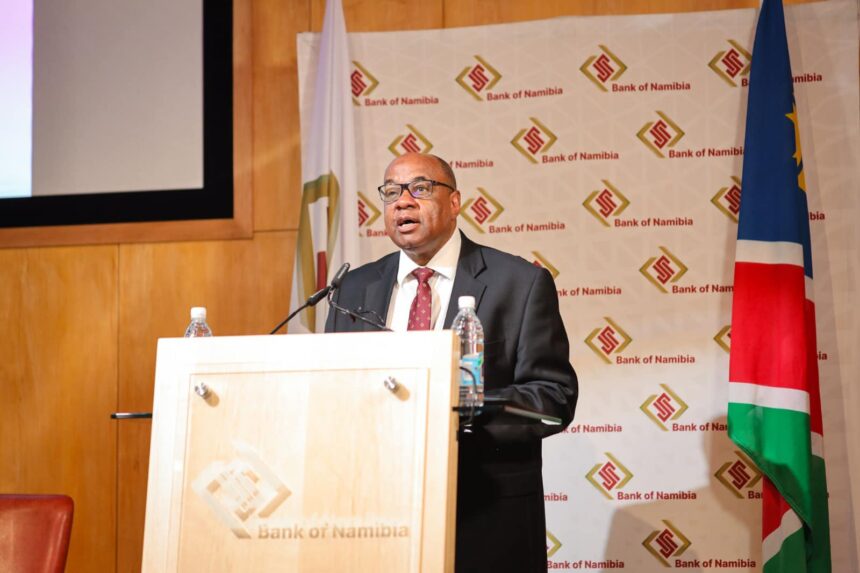Many Namibian consumers were yesterday given a reason to cheer after years of suffering from the financial stress of a high-interest rate environment.
This is because the central bank reduced the repo rate to 7.50% from 7.75% for the first time since June 2022.
Due to the decision made by the Bank of Namibia’s monetary policy committee, the prime lending rate at commercial banks will now be reduced to 11.25%, thereby minimally reducing mortgage payments, which in turn theoretically provides consumers with more disposable income.
Higher interest rates result in bank loan repayments being relatively more expensive.
The repo rate is defined as the lending rate offered by a central bank to commercial banks for short-term funding requirements.
The commercial banks then pass on the repo rate in the form of interest rates to consumers through bank loans.
Consumers with high debt repayments at commercial banks have been crying over high interest rates that have been draining their pockets, leaving many to wonder how they will survive.
Central bank governor Johannes !Gawaxab yesterday said he understands that bank loans are still expensive, but said the reduction should provide some much-needed relief.
“We understand interest rates remain high, but we remain focused on our mandate to ensure that inflation stays low, and the value of our currency is protected. The restrictive monetary policy stance of the past 18 months assisted in putting downward pressure on inflation,” he noted.
Hearing yesterday’s repo rate news, a homeowner, who prefers anonymity, said this is news they have been praying for.
“These mortgage payments have been killing us. When month-end is here, my heart always jumps in shock at seeing the debit order go off. As little as it may seem, this will really save my pockets,” he noted.
Meanwhile, !Gawaxab noted that domestic headline inflation remained steady at 4.6% in July 2024 and June 2024.
The biggest contributors to the annual inflation rate were food and non-alcoholic beverages (1.0%); alcoholic beverages and tobacco (0.7%); housing, water, electricity and gas (1.0%) as well as a reduction in transport (1.0%).
Baseline estimates suggest inflation will average 4.7% and 4.4% in 2024 and 2025, respectively.
Gross domestic product (GDP) growth is estimated to slow to 3.1% in 2024 due to the expected slower growth in the primary industry.
Moreover, the central bank governor touched on private sector credit extension (PSCE), saying its growth continues to be restrained by tight lending conditions amid eroded real incomes and a restrictive monetary policy.
In addition, Namibia’s merchandise trade deficit widened to N$19.9 billion during the first half of 2024.
The wider trade deficit was primarily underpinned by higher import payments in the categories of machinery, equipment and base metals.
This was largely due to increased exploration activities.
“The higher deficit was further exacerbated by a decline in export receipts, attributable to lower diamond exports, largely reflecting the depressed diamond prices,” he added.
Namibia’s stock of international reserves as at 31 July 2024 stood at N$60.8 billion.
Reactions
Speaking to New Era, independent economic researcher Josef Sheehama said the reduction in interest rates is good news for Namibian homeowners and potential purchasers.
“Although 25 basis points won’t drastically change the situation for buyers today, the drop is generally seen as the beginning of a trend towards lower rates – and as rates decline, so will expenses associated with mortgages. While the rate drop won’t have a significant effect on mortgage costs right now, a downward trend could encourage prospective buyers to step up their house hunt as confidence in the economy grows,” said the economist.
He added that the reduction will give borrowers some much-needed leeway in managing household cashflows during difficult times so they can continue paying off their debts.
He continued that a lower repo rate may stimulate businesses to borrow money, and make expansionary investments, which could increase economic activity.
“This is bad news for investors because a lower repo rate may compel foreign investors to withdraw their funds in search of higher returns, which would weaken the value of the currency,” he said.
Senior economist Omu Kakujaha-Matundu yesterday welcomed the repo rate reduction.
“It is some relief to many, and could stimulate the economy, as businesses can reinvest their savings on interest charges, and consumers will spend their savings on mortgages and other goods and services, increasing aggregate demand, and hence stimulating economic growth,” he said.
He concurred that this is bad news for investors: “Investment yields will be adversely affected. They will earn less on their unit trusts, fixed deposits and other investments. Will they shift to South Africa? That depends on how long that divergence of 50 basis points will last,” he noted.
-mndjavera@nepc.com.na
Caption:



